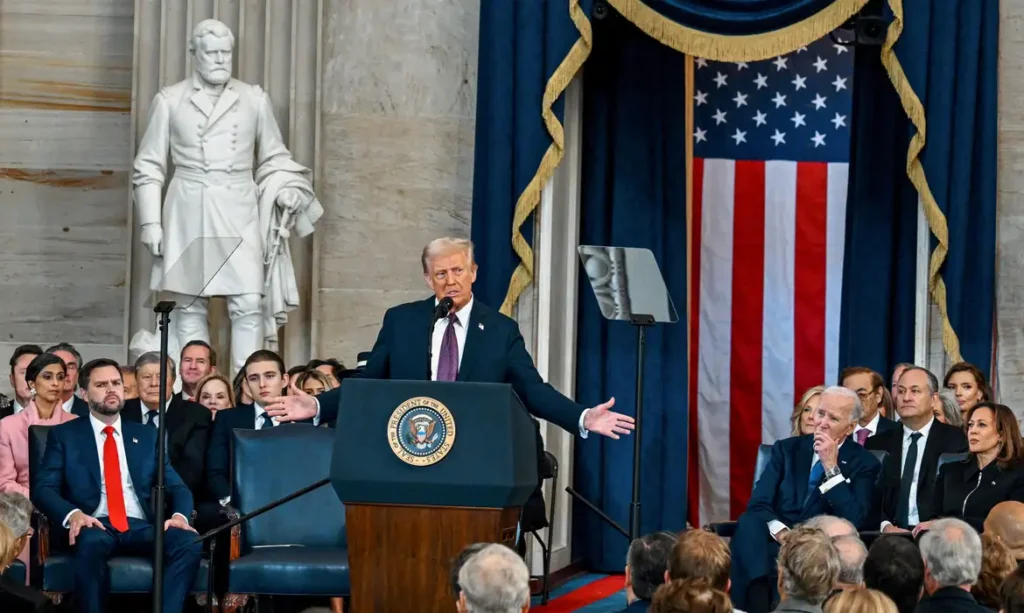U.S. President Donald Trump has indicated that he will consider granting Australia an exemption from tariffs imposed on steel and aluminum imports, following a phone conversation with Australian Prime Minister Anthony Albanese. This move comes amid Trump’s stricter foreign trade policies, which led to the reintroduction of 25% tariffs on steel and 10% tariffs on aluminum imported to the United States. Trump’s decision raised concerns among various trade partners and increased fears of an escalation in international trade disputes.
The decree signed by the U.S. president reimposed tariffs on millions of tons of steel and aluminum that were previously exempt from taxes due to quota agreements, exemptions, and specific product exclusions. The new measure aims to strengthen the U.S. steel industry and reduce reliance on imports, but it also threatens to destabilize trade relations with allied countries.

Although Australia is a relatively small steel exporter globally, it plays a key role in the international steel raw materials market, being the world’s largest exporter of iron ore. Moreover, the country maintains a balanced trade relationship with the United States, being one of the few partners with which the U.S. has a trade surplus. According to Albanese, Australian steel and aluminum exports account for only 1% and 2%, respectively, of the total U.S. imports of these products, reinforcing the argument that Australia does not pose a threat to the U.S. domestic industry.
Trump’s decision sparked mixed reactions within the Australian industrial sector. While some business leaders expressed concern over the economic impact of the tariffs, others viewed the potential exemption as an opportunity to strengthen the trade relationship between the two countries. The Australian government highlighted that steel and aluminum exports to the U.S. create thousands of direct and indirect jobs, boosting the national economy and strengthening bilateral ties.
During the phone call, Albanese emphasized the importance of Australia as a strategic partner and ally of the United States, arguing that the tariffs could harm the economic and security cooperation between the two countries. The Australian Prime Minister stressed that Australian processed steel exports not only create jobs in the U.S. but are also vital for shared defense interests, particularly within the AUKUS security pact, which involves the U.S., the U.K., and Australia.
Following the call, Trump acknowledged the significance of the trade relationship between the countries and mentioned that Australia is one of the few trade partners with which the U.S. has a surplus, attributing this to the significant U.S. aircraft purchases by the Australian government. “We have a surplus with Australia. One of the few. And the reason is they buy a lot of planes. They are far away and need a lot of planes,” Trump said, highlighting the economic interdependence between the nations.
In addition to the tariff discussion, the conversation touched on other aspects of the bilateral relationship, including cooperation in technology, security, and investments in infrastructure. Albanese highlighted the importance of Australia as a destination for U.S. companies seeking to expand operations in the Indo-Pacific region, while Trump reaffirmed the U.S.’s commitment to the strategic alliance between the two countries.
Although Trump initially stated there would be no exceptions to the new tariffs, he indicated that Australia’s situation deserved special consideration. “I told him this is something we will give great consideration,” said the U.S. president, adding that Albanese is “a very good man” and that the conversation was productive.
The Australian Prime Minister expressed optimism regarding a potential agreement with the U.S. “We agreed on the wording to publicly say that the U.S. president agreed that an exemption was being considered,” Albanese stated. He emphasized that the dialogue between the two nations has been constructive and that the Australian government would continue to actively defend the country’s trade interests.
The Australian industry continues to closely monitor the developments of the negotiations, assessing potential impacts on sectors such as manufacturing and construction. International trade experts note that an exemption for Australia could set a precedent for other countries to demand similar treatment, challenging Trump’s protectionist approach.
The strong partnership between the two countries was recently reinforced by high-level diplomatic meetings. Australia’s Foreign Minister Penny Wong attended Trump’s inauguration, while Defense Minister Richard Marles met with U.S. Defense Secretary Pete Hegseth in Washington. This was Hegseth’s first meeting with a foreign counterpart following his confirmation, underscoring the importance of the alliance between the two nations.
Additionally, the Australian government has intensified diplomatic efforts to ensure that the trade relationship remains solid, regardless of tariff decisions. Australian trade representatives have held meetings with U.S. authorities to explore alternatives that minimize the tariffs’ impact on the Australian economy and strengthen long-term trade ties.
Meanwhile, the Australian Aluminum Council has stated it is still assessing the impact of possible tariffs on aluminum trade between the two countries, emphasizing the need for a clear stance from the U.S. government regarding potential exemptions. Companies in the sector have already begun making strategic adjustments to cope with possible changes in the trade landscape, diversifying markets and strengthening agreements with Asian and European partners.
Given the history of cooperation between the two countries and Australia’s recognition as a key strategic partner, negotiations are expected to progress positively. Albanese reiterated his confidence in a favorable outcome: “If you look at what we have already achieved, it’s been a tremendous start to the relationship,” he said.
With developments still ongoing, the focus now shifts to Trump’s final decision and the impact this potential exemption could have on other countries affected by the tariffs. If granted, Australia could further cement its position as a privileged U.S. ally, while other nations press for similar treatment. In the meantime, the Australian industrial sector remains on alert, seeking to mitigate risks and ensure its competitiveness in the global market is not compromised.

